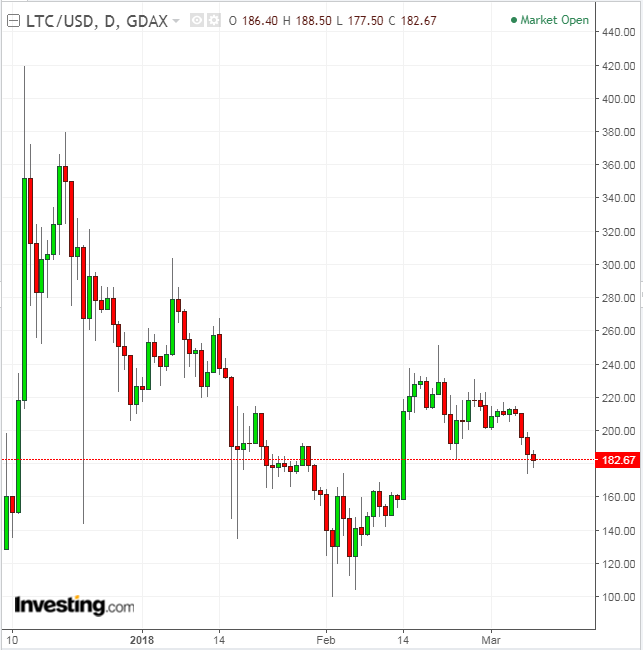As cryptocurrencies gain traction globally, a number of firms have taken steps to integrate digital currencies into the mainstream economy, enabling these new assets to be used as a form of payment with which to purchase everyday items.
Firms such as Atlanta-based BitPay, which recently announced the launch of its prepaid BitPay Visa (NYSE:V) card, and San Francisco-based LitePay, were founded specifically to ease the payment process using Bitcoin and Litecoin respectively, making it easier for merchants to accept those cryptocurrencies in lieu of established, fiat currencies.

BitPay's Visa card makes it possible to transact purchases as one would with any prepaid credit card.

LitePay is poised to launch its own payment system as well, but the kick-off has been delayed due to "setbacks." Though the release of its consumer debit card was scheduled for this past Monday, according to Inverse.com "LitePay claimed that its consumer debit card was still on hold." The news weighed on the alt currency, pushing it lower.
PayPal (NASDAQ:PYPL) also recently filed for a patent for its own "expedited virtual currency transaction system" that specifically flagged Bitcoin as the payment method.
It's likely banks and payment sector giants such as PayPal will cherry-pick parts of the blockchain and crypto technologies without fully embracing decentralization says Sean Gardner, CEO and co-founder of Emanate, an artist collaborative built on the EOS blockchain. For that reason a divide will continue to exist between the stalwarts of the current system and the pioneers of the new, he says.
“I believe that sharing, side-chains, and off-chain processing will help get the core cryptos ‘up-to-speed’, but there is still an inherent volatility problem, which happens to be driving rapid adoption and growth via speculative investing.”
Another popular option being explored involves digital wallets and smartphones displacing credit cards, thereby also saving on transaction costs.
Jonathan Alexander, founder and project director of Netvote, a decentralized voting network built on the Ethereum blockchain, explains:
"Digital wallets on smartphones are likely to displace credit cards in the next five years and the consumer-preferred wallets will support Bitcoin. Square (NYSE:SQ) has already released this, PayPal is working on it, and Coinbase has announced it as a key part of their strategy.
This will also help emerging countries, and the smartphone wallets and apps will support more than just cryptocurrencies, for example, driver's licenses, health insurance IDs, government IDs, even voting are all going to be supported on smartphones using crypto and blockchain. This will result in huge cost savings but also increased consumer security.”
Beware the Technical Barriers
JP Thor warns that the key issue for cryptocurrencies is their high technical barrier to entry, combined with poor user experience right now. The CEO of CanYa, a blockchain-powered marketplace of services further notes that the solution will be to ensure a smooth and seamless experience so that the benefits of crypto are realized without the cost of additional complexity.
Yoav Dror, CEO of PumaPay, a blockchain payment option offering billing mechanisms for e-commerce points out that there have been multiple attempts at integrating crypto payments into daily life, but most are focused on Bitcoin, thus running up against the limitations of currency's blockchain. In particular, the time is takes for a transaction to be confirmed via the BTC blockchain, can go as high as one hour.
Dror warns that there are high fees as well as additional issues still to be addressed:
“As BitPay, one of the leading Bitcoin payment providers points out, ‘transactions on the Bitcoin network itself aren't controlled or confirmed by BitPay, but by the Bitcoin miners which group transactions into "blocks" and add those blocks to the Bitcoin "blockchain"—the shared historical record of all transactions. When a transaction has been added to a block six blocks previously, it's considered a done deal.’
Here’s some simple math: mining one block takes at least 10 minutes, so 6 blocks = 1 hour, which is unacceptable for everyday payments.”
It is important to note that transaction fees remain high, and it’s the customer who pays them. With Bitcoin transactions, they're referred to as ‘miners fees’ and are used to incentivize bitcoin miners to confirm Bitcoin transactions.
Dror notes that the more quickly you want your ransaction processed, the higher the amount you'll pay in miner’s fees. Currently an average Bitcoin transaction fee is around $20—too high for micropayments and everyday use.
Is there a fix on the horizon? Says Drof:
“It is clear that the solution of integrating crypto payments into the daily life needs to come from a brand new approach and to be built on the next-generation blockchain, ensuring nearly immediate processing of transactions as well as bringing the transaction fees closer to zero.
The successful crypto payment solution should enable multiple payment scenarios which we’re used to in our day-to-day life, such as recurring payments, pay-per-use, direct debit, shared payments (think commissions and affiliate programs) and more, which have been impossible on the blockchain before."
Major revolution
Dr. Asher Idan, advisor to Yoo-Mi PHA explains that the marketplace is at the precipice of a major revolution in how cryptocurrencies will be incorporated into the general economy:
“Not only have some of the world’s biggest banks committed to building their own internal blockchains, but myriad hi-tech companies are altering existing business models away from the producer sharing economy to the consumer sharing economy, using crypto for everything from ride shares to flat shares.”
